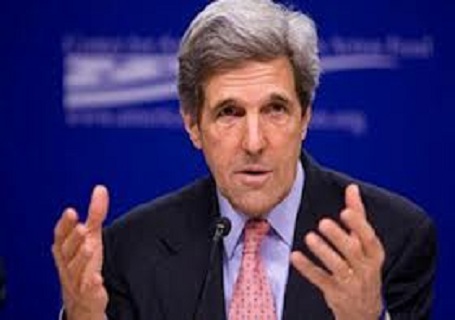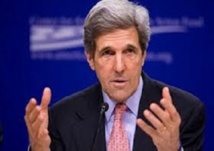It would come just a day before Islamist leader Morsi, the country's first democratically elected president, is due to go on trial on charges of inciting the murder of protesters outside the presidential palace in December 2012.
Clashes and unrest between supporters of Morsi's Muslim Brotherhood and military security forces have left about 1,000 dead since he was overthrown by the army on July 3.
The US administration has openly voiced concern at the lack of visible progress by the interim military-led leadership toward restoring democracy and holding fresh presidential and parliamentary elections.
Washington announced in early October that it was "recalibrating" its aid to Egypt, which includes about $1.3 billion for military assistance.
It also said it was suspending the delivery of big-ticket items such as Apache helicopters, F-16 fighter jets, M1A1 Abrams tank parts and Harpoon missiles until it sees some progress on democratic reforms.
If Kerry's Cairo trip goes ahead, the timing is somewhat awkward, with Morsi's trial likely to inflame further protests by his Islamist backers.
A huge security net is being thrown over the southern part of the city, with some 20,000 police being deployed to guard the police academy where proceedings against Morsi and 14 other defendants will take place.
US officials have repeatedly called for Morsi's release and for an end to any politically motivated trials.
But Egypt's official MENA news agency said Friday that Kerry would only stay in Cairo for "several hours."
US officials, meanwhile, say he will arrive in Saudi Arabia some time on Sunday, where he also faces tough talks with the kingdom's leaders, including King Abdullah.
Kerry's 17th trip since becoming secretary of state in February will also take him to Poland, Israel, Bethlehem, Jordan, the United Arab Emirates, Algeria and Morocco, and he is due to return to Washington on November 12.
Along with its concerns over the hesitant US policy towards the bloody conflict in Syria and Washington's outreach to arch foe Iran, Saudi Arabia has been dismayed by the freezing of US aid to Egypt, seen as a cornerstone of regional stability.
The Gulf kingdom had considered Morsi's Muslim Brotherhood a threat and had quickly pledged financial aid to Egypt's new military-installed authorities congratulating interim Egyptian president Adly Mansour after he was appointed in July and unveiling a $5 billion aid package.
The dragging war in Syria, now in its 31st month, is also one of the major bones of contention straining ties between Washington and Riyadh, a staunch supporter of the Syrian opposition rebels fighting to oust Syrian President Bashar al-Assad.
In an unprecedented move, Riyadh earlier this month turned down a coveted non-permanent seat on the UN Security Council in protest at the world body's failure to end the war that has left over 115,000 dead.
Saudi intelligence chief Prince Bandar bin Sultan al-Saud also reportedly told diplomats last month that he would scale back Saudi cooperation with the CIA on training Syrian rebels, and work with other allies including Jordan and France.
State Department spokeswoman Jen Psaki praised Riyadh this week "as an enormously important partner" on all issues including Iran, as Western powers seek to rein in its suspect nuclear program, and said that if there were concerns among allies, Kerry believed in the power of face-to-face talks.
"The secretary, overall, believes that rolling up his sleeves and having personal diplomacy is the way that we should continue to approach either issues we work together on, global challenges, or issues where there may be concerns," Psaki said.
-----------------------------------------------------------------------------------------------------
Clashes and unrest between supporters of Morsi's Muslim Brotherhood and military security forces have left about 1,000 dead since he was overthrown by the army on July 3.
The US administration has openly voiced concern at the lack of visible progress by the interim military-led leadership toward restoring democracy and holding fresh presidential and parliamentary elections.
Washington announced in early October that it was "recalibrating" its aid to Egypt, which includes about $1.3 billion for military assistance.
It also said it was suspending the delivery of big-ticket items such as Apache helicopters, F-16 fighter jets, M1A1 Abrams tank parts and Harpoon missiles until it sees some progress on democratic reforms.
If Kerry's Cairo trip goes ahead, the timing is somewhat awkward, with Morsi's trial likely to inflame further protests by his Islamist backers.
A huge security net is being thrown over the southern part of the city, with some 20,000 police being deployed to guard the police academy where proceedings against Morsi and 14 other defendants will take place.
US officials have repeatedly called for Morsi's release and for an end to any politically motivated trials.
But Egypt's official MENA news agency said Friday that Kerry would only stay in Cairo for "several hours."
US officials, meanwhile, say he will arrive in Saudi Arabia some time on Sunday, where he also faces tough talks with the kingdom's leaders, including King Abdullah.
Kerry's 17th trip since becoming secretary of state in February will also take him to Poland, Israel, Bethlehem, Jordan, the United Arab Emirates, Algeria and Morocco, and he is due to return to Washington on November 12.
Along with its concerns over the hesitant US policy towards the bloody conflict in Syria and Washington's outreach to arch foe Iran, Saudi Arabia has been dismayed by the freezing of US aid to Egypt, seen as a cornerstone of regional stability.
The Gulf kingdom had considered Morsi's Muslim Brotherhood a threat and had quickly pledged financial aid to Egypt's new military-installed authorities congratulating interim Egyptian president Adly Mansour after he was appointed in July and unveiling a $5 billion aid package.
The dragging war in Syria, now in its 31st month, is also one of the major bones of contention straining ties between Washington and Riyadh, a staunch supporter of the Syrian opposition rebels fighting to oust Syrian President Bashar al-Assad.
In an unprecedented move, Riyadh earlier this month turned down a coveted non-permanent seat on the UN Security Council in protest at the world body's failure to end the war that has left over 115,000 dead.
Saudi intelligence chief Prince Bandar bin Sultan al-Saud also reportedly told diplomats last month that he would scale back Saudi cooperation with the CIA on training Syrian rebels, and work with other allies including Jordan and France.
State Department spokeswoman Jen Psaki praised Riyadh this week "as an enormously important partner" on all issues including Iran, as Western powers seek to rein in its suspect nuclear program, and said that if there were concerns among allies, Kerry believed in the power of face-to-face talks.
"The secretary, overall, believes that rolling up his sleeves and having personal diplomacy is the way that we should continue to approach either issues we work together on, global challenges, or issues where there may be concerns," Psaki said.
-----------------------------------------------------------------------------------------------------









 Home
Home Politics
Politics











